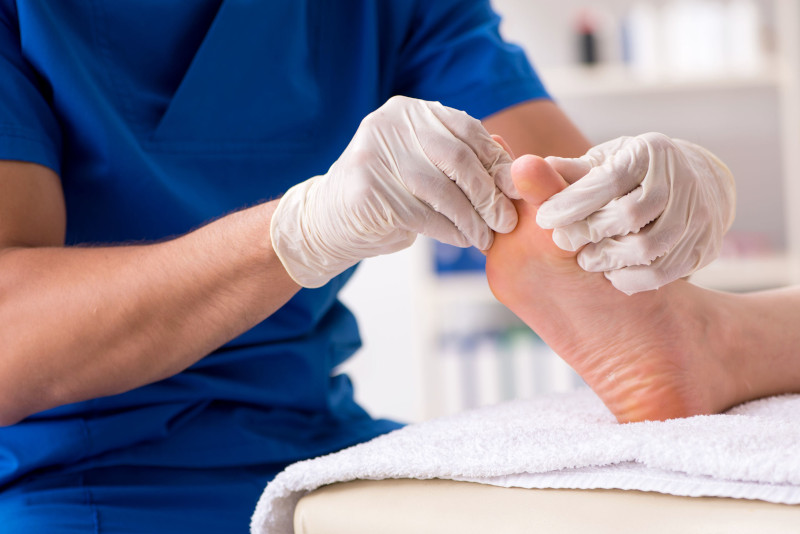Diabetes is a chronic medical condition that affects millions of people worldwide. While proper management of diabetes can significantly improve the quality of life for those affected, Individuals living with diabetes must be aware of when it’s time to see a diabetic ulcer specialist in Toms River to ensure they receive timely and effective care.
Diabetic Ulcer Specialist in Toms River | The Importance of Diabetic Foot Ulcer Care
Diabetic foot ulcers are open sores or wounds that often develop on the feet of individuals with diabetes. These ulcers can result from various factors, including poor circulation, neuropathy (nerve damage), and uncontrolled blood sugar levels. Unfortunately, diabetic foot ulcers can lead to severe complications, such as infections, gangrene, and even amputations if not managed properly.
Early intervention and specialized care from a diabetic ulcer specialist are crucial for preventing these complications and promoting the healing of ulcers. Knowing when to seek professional help can make all the difference in preserving the health of your feet and overall well-being.
When Should You See a Toms River Diabetic Ulcer Specialist?
Persistent Sores or Wounds:
If you have diabetes and notice any persistent sores, wounds, or blisters on your feet that don’t seem to heal despite proper wound care, it’s time to see a diabetic ulcer specialist in Toms River. Diabetic foot ulcers can be stubborn and slow to heal due to impaired blood flow and compromised immune function, making expert guidance essential in managing them.
Signs of Infection:
Any signs of infection around a foot ulcer should never be ignored. Redness, warmth, swelling, increased pain, or discharge from the wound are all indicators of a possible infection. A diabetic ulcer specialist can assess the severity of the infection, prescribe antibiotics if necessary, and recommend appropriate wound care techniques to prevent it from worsening.
 Increasing Pain or Discomfort:
Increasing Pain or Discomfort:
If you experience increasing pain or discomfort in the area of a diabetic foot ulcer, it’s time to seek specialized care. Pain can be a sign of various issues, such as nerve damage or worsening infection, and addressing these concerns promptly can help prevent further complications.
Changes in Foot Appearance:
Changes in the appearance of your foot, such as the development of calluses, deformities, or changes in skin color, can be warning signs that require attention from a diabetic ulcer specialist in Toms River. These changes can indicate alterations in foot structure or circulation, which can contribute to ulcer formation.
Neuropathy Symptoms:
Neuropathy is a common complication of diabetes that can affect sensation in the feet. If you experience numbness, tingling, or loss of feeling in your feet, it’s crucial to see a specialist. Neuropathy can make it challenging to detect minor injuries or discomfort, increasing the risk of developing diabetic foot ulcers.
Poor Blood Sugar Control
Uncontrolled blood sugar levels can contribute to the development and worsening of diabetic foot ulcers. If you’re struggling to manage your diabetes and maintain stable blood sugar levels, it’s essential to consult with a Toms River diabetic ulcer specialist to develop a tailored treatment plan.
Previous Ulcer History:
If you’ve had diabetic foot ulcers in the past, you are at a higher risk of developing new ones. Regular follow-ups with a diabetic ulcer specialist are essential to monitor the health of your feet, identify potential issues early, and prevent recurrent ulcers.
Difficulty Performing Self-Care:
Diabetic foot ulcer management often involves complex wound care routines. If you find it challenging to perform these self-care tasks due to mobility issues, visual impairment, or other limitations, a diabetic ulcer specialist can offer guidance and assistive devices to help you maintain proper foot care.
Foot Deformities or Structural Abnormalities:
Individuals with diabetes may develop foot deformities or structural abnormalities that increase the risk of ulcer formation. If you have hammertoes, bunions, or other foot deformities, seeking advice from a specialist can help you manage these conditions and reduce the risk of ulcers.
In conclusion, diabetic foot ulcers are a serious complication of diabetes that require specialized care to prevent severe complications and preserve the health of your feet. Those living with diabetes must be vigilant and proactive in recognizing the signs that indicate it’s time to see a Toms River diabetic ulcer specialist. Seeking early intervention and expert guidance can make a significant difference in your overall health and well-being. If you or a loved one are living with diabetes and experiencing any of the warning signs mentioned above, do not hesitate to reach out to a diabetic ulcer specialist in Toms River for comprehensive care and support. Remember, early action can be the key to preventing diabetic foot ulcer-related complications.
Looking for a Highly-Experienced Toms River Diabetic Ulcer Specialist?
Dr. Manooj Prasad at Garden State Foot & Ankle Group of Toms River is a highly experienced podiatrist with an ardent mission to help those suffering from foot, ankle, and lower leg issues. He offers personalized care while considering each patient’s individual lifestyle needs so that the best possible treatment can be administered. Based in both Essex County and Ocean County in New Jersey, service towns include Jackson, Belleville, Roseland, Point Pleasant, Cedar Grove, Livingston, Millburn, Short Hills, Lakewood, Ocean Gate, Lakehurst, Toms River, Montclair, and many more! For more information, you can contact us today at (732)557-9900 (Toms River) 973)450-3035 (Belleville) or explore our website.
